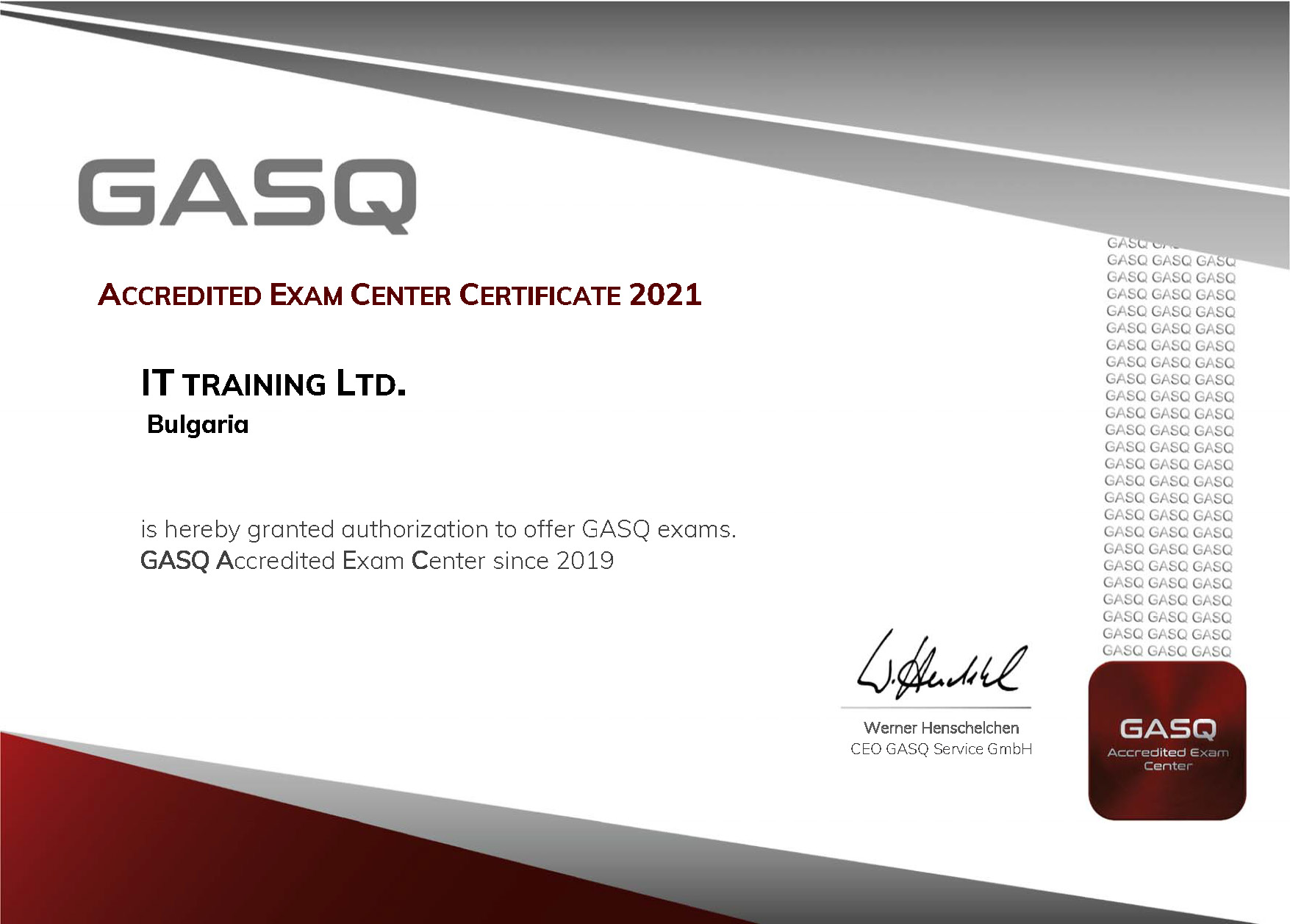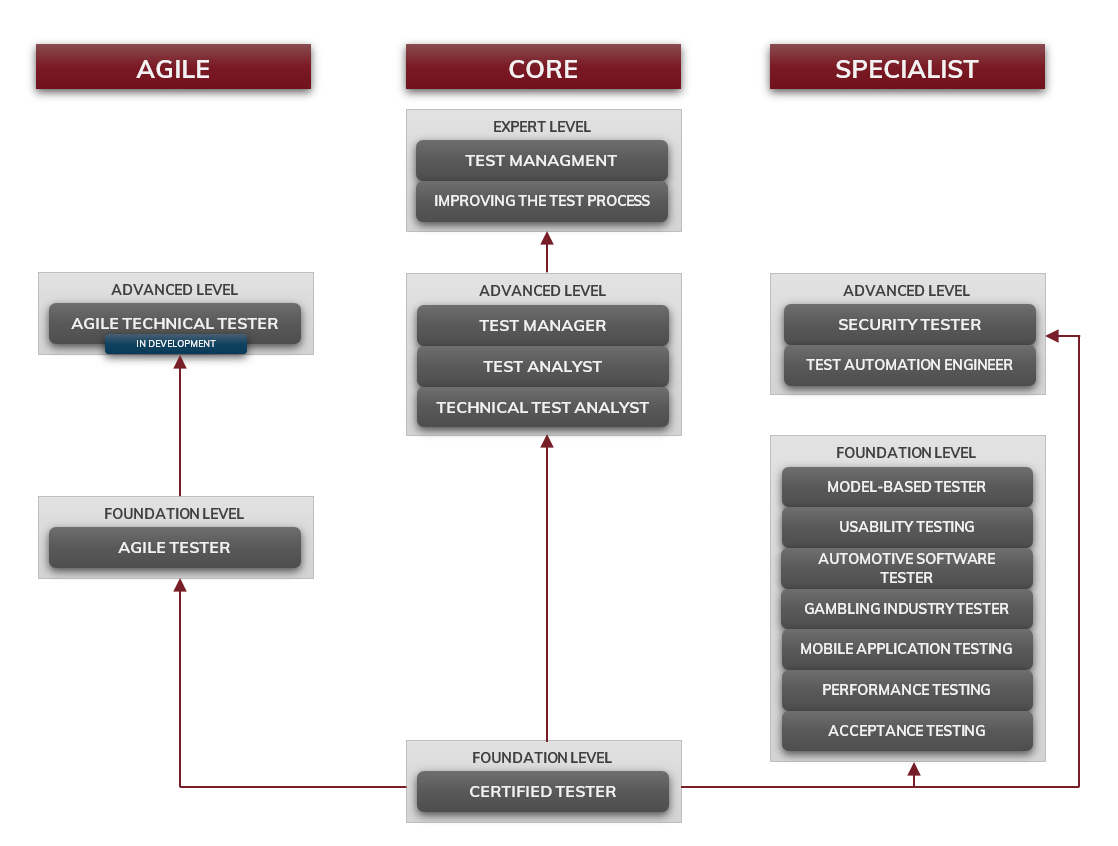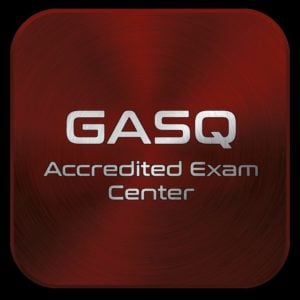
ISTQB Test Center for 2021 (Acredited by GASQ)
IT-Training.pro е сертифициран тест център за провеждане на официални ISTQB сертификационни изпити през 2021.
Резервирайте своят изпит при нас в COVID-19 сигурна обстановка. Всички изпити се провеждат в Private формат.
ISTQB Foundation Level
The Foundation Level syllabus includes the following sections: The Fundamentals of Software Testing, Testing During the Product Lifecycle, Dynamic Testing, Static Testing, Test Management, and Testing Tools.
Target group:
The foundational level of the Certified Tester training program aims at all individuals who are involved in software testing activities of any kind. This includes individuals holding positions as testers, test analysts, testing engineers, testing consultants, test managers, acceptance testers and software developers. The foundation level also addresses the needs of individuals holding positions such as project manager, quality manager, software development manager, system analytics specialist (business analysts), IT managers or management consultants who are eager to acquire basic knowledge and a fundamental understanding of software testing applications.
Validity
Once achieved, the ISTQB Certified Tester Foundation Level certification does not expire.
Certification prerequisites
There are no formal prerequisites for certification. Nevertheless, we recommend participation in a training program offered by an ISTQB accredited training provider prior to taking the exam. In order to acquire the title of ISTQB Certified Tester you simply have to pass the Foundation Level exam.
The new ISTQB Foundation Level Syllabus 2018 is now published.
ISTQB Agile Tester
Agile testing is a relatively new approach to software testing that follows the principles of agile software development as outlined in the Agile Manifesto.
A tester on an Agile project will work differently than one working on a traditional project. Testers must understand the values and principles that underpin Agile projects, and how testers are an integral part of a whole-team approach together with developers and business representatives.
There is a lot of confusion concerning agile testing – which means there’s an educational opportunity as well. The Agile Tester certification will give the tester the knowledge to be a high-performing member of agile testing teams.
Validity
Once achieved, the ISTQB Agile Tester certification does not expire.
Certified agile testers should be able to demonstrate their skills in the following areas:
- The Fundamentals of Agile Software Development
- The different agile approaches
- The Differences between Testing in Traditional and Agile Approaches
- Testing in Agile Projects
- Roles and skills of a tester in Agile Projects
- Agile testing techniques and methods
- Assess product quality risks within an Agile project
- Estimate testing effort based on iteration content and quality risks
- Tools in Agile Projects
Certification prerequisite is ISTQB Foundation Level certificate.
ISTQB Model-Based Tester
Model-based testing is a concept that focuses on the software testing that generates from models that are abstract and represent a certain function or expected behavior of the system. This approach views software testing as an integral part of software development, which makes it both challenging and extremely beneficial for IT businesses.
Model-Based Tester module provides the professional testers with additional knowledge and skills in the area of model-based testing process, methodology and techniques. This qualification would be useful not only for software testing specialists, like software testers, test analysts, technical test analysts and test managers, but also for anyone who wants to understand the use of models for test generations.
Validity
Once achieved, the ISTQB Model-Based Tester certification does not expire.
Certified Model-Based testers should be able to demonstrate their skills in the following areas:
- Objectives and motivations for MBT
- MBT activities and artifacts in the test process
- Integrating MBT into the software development lifecycles
- MBT modeling activities
- Languages for MBT models
- Good practices for MBT activities
- Classification and application of MBT test selection critetia
- Evaluating and deploying an MBT approach
- Managing and monitoring of an MBT approach deployment
Certification prerequisite is ISTQB Foundation Level certificate.
Automotive Software Tester
Automotive Software Tester Module is mostly directed on professional software testers who have mastered the fundamentals of testing and want to devote their carreer to automotive branch.
The certification can also be useful for test analysts, test engineers, test managers, software developers, as well as anyone who would like to learn more about software testing in automotive projects.
Validity
Once achieved, the ISTQB Automotive Software Tester certification does not expire.
Automotive Software Tester Certification would allow the participants:
- Work effectively in a test team
- Apply the methods and techniques acquired with the Foundation Level certification in an automotive software testing setting
- Obtain a general understanding of the standards relevant for the automotive branch, such as Automotive SPICE®, ISO 26262, etc.
Certification prerequisite is ISTQB Foundation Level certificate.
Usability Testing
The target group of Usability Testing certifications includes anyone who has experience in software testing and would like to broaden their comprehension of usability testing. This also applies to professionals who would like to advance in their carreer and become a speciaist in usability testing.
Once achieved, the ISTQB Usability Testing certification does not expire.
Certification prerequisite is ISTQB Foundation Level certificate.
Usability Testing Certification candidates should be able to demonstrate their knowledge and skills with regard to following activities:
- Identify and classify the usability risks in a certain project at any stage of a development cycle.
- Be familiar with the concepts of usability, user experience, and accessibility, as well as their standards.
- Plan the project in a way that stated usability, user experience and accessibility goals are achieved in practice.
- Monitor the implementation of the test plan for achieving stated usability, user experience and accessibility goals.
ISTQB Performance Tester
The ISTQB Performance Tester qualification is aimed at anyone involved in software testing who wishes to broaden their knowledge of performance testing or anyone who wishes to start a specialist career in performance testing. The qualification is also aimed at anyone involved in performance engineering who wishes to gain a better understanding of performance testing.
Performance Testing Certification: Improve your software performance testing – and your career.
Validity
Once achieved, the certification does not expire.
Certified performance testers will be able to demonstrate their skills in the following areas:
- Understand the basic concepts of performance and performance testing
- Define performance risks, goals, and requirements to meet stakeholder needs and expectations
- Understand performance metrics and how to collect them
- Develop a performance test plan for achieving stated goals and requirements
- Conceptually design, implement, and execute basic performance tests
- Analyze the results of a performance test and state implications to various stakeholders
- Explain the process, rationale, results, and implications of performance tests to various stakeholders
- Understand categories and uses for performance tools and criteria for their selection
- Determine how performance testing activities align with the software lifecycle
Acceptance Testing
This acceptance testing qualification is aimed at anyone involved in software acceptance testing activities. This includes people in roles such as product owners, business analysts, testers, test analysts, test engineers, test consultants, test managers, user acceptance testers, and software developers.
The focus of the syllabus is on the concepts, methods and practices of collaboration between product owners / business analysts and testers in acceptance testing.
The ISTQB Foundation Level certificate shall be obtained before taking the Foundation Level Acceptance Testing certification exam.
The main parts of the Syllabus are the following:
- Introduction and Foundations
- Acceptance Criteria, Acceptance Tests and Experience- Based Practices
- Business Process and Business Rules Modeling
- Acceptance Testing for Non-Functional Requirements
- Collaborative Acceptance Testing
Mobile Application Testing
Mobile Application Testing (MAT) module requires the set of skills and qualifications needed for software testing and the ability to apply these and develop them further in the context of mobile applications.
The learning objectives of MAT are directed on specific issues and features that are especially relevant for this type of testing. These include: developing test strategies based on the mobile market, preparing tests compatible with different types of mobile devices and their characteristics, understanding and mitigating the security issues related to mobile apps etc.
The ISTQB Foundation Level certificate is a prerequisite for taking the Mobile Application Testing exam.
The main parts of the Syllabus are the following:
- Business and Technology Drivers
- Mobile Application test Types
- Common Test Types and Test Process for Mobile Applications
- Mobile Application Platforms, Tools and Environment
- Automating the Test Execution
ISTQB Advanced Level Core
The Advanced Level builds on the concepts introduced in the Foundation Level and includes more higher-level and advanced material. It is divided into three modules: Test Manager, Test Analyst (previously called Functional Tester) and Technical Test Analyst (previously called Technical Tester). Participants have the option to pass an exam upon completion of each module.
Validity
Once achieved, the ISTQB Certified Tester Advanced Level certification does not expire.
The Test Analyst and Technical Test Analyst exams based on Syllabus 2012 will be available until 04.02.2021 in English language and until 04.08.2021 in other languages. After that, it is only possible to take these exams based on Syllabus 2019.
The Test Manager module comprises the following components:
Test Management, Reviews, Error and Deviation Management, Test Optimization Process, Test Tools, Team Composition.
The Test Analyst module (previously called Functional Tester) comprises, among others, the following components:
Test Processes, Selection and Application of Test Processes, Functional Testing Techniques, Blackbox Tests, Reviews and Roles.
The Technical Test Analyst module (previously called Technical Tester) comprises, among others, the following components:
Test Process, Specification Based and Structure Based Test Processes, Static and Dynamic Analysis, Test of Software Properties, Test Tools: Selection, Evaluation and Introduction.
ISTQB Expert Level
The Expert Level comprises a variety of specialized topics and targets professional software testers who are highly experienced in the discipline.
The following syllabi have been released:
Test Management:
Part 1: Strategic Test Management
Part 2: Operational Test Management
Part 3: Managing the Test Team
Improving the Testing Process:
Part 1: Assessing test processes
Part 2: Implementing test process improvement
Why Expert?
The Expert Level extends the knowledge and experience obtained at the Advanced Level by providing in-depth, practically-oriented certifications in a range of different testing subjects.
Clear Business Outcomes
Each Expert Level module has clear business outcomes. These provide information to businesses concerning the expectations of an expert in a particular subject. The business outcomes map to the individual Learning Objectives in a particular module.
Achieving Expert Level
Criteria are set to ensure good and consistent quality of those wishing to achieve Expert Level certification.
To obtain Expert Level certification, candidates must have:
- the Foundation Certificate
- the appropriate Advanced Level Certification; dependent on the Expert Module desired
- passed the Expert Level Exam
- at least 5 years of practical testing experience
- at least 2 years of industry experience in the specific Expert Level topic
Note that the experience criteria may also be attained after taking the exam. It is highly recommended, however, that the candidate obtain this practical experience before taking the exam. If a non-public exam is to be taken, completion of an Expert Level course is mandatory.
What skills does an Expert Level individual have?
An expert is a person with the special skills and knowledge representing mastery of a particular subject. Being a testing expert means possessing and displaying special skills and knowledge derived from training and experience and being able to apply that knowledge in real-life situations.
A testing expert is one that combines a broad understanding of testing in general with an in-depth understanding in a special test area. An in-depth understanding means sufficient knowledge of testing theory and practice to be able to influence the direction that an organization and/or project takes when creating, implementing and executing testing activities related to the special area.
Expert Level exam structure and training
A certification scheme at Expert Level must meet the expectations and perceptions of its stakeholders and has to be seen to be truly “expert”. An exam score above 75% is required to pass.
An expert must not only be able to show knowledge, but also in depth practical skills; as a consequence an exam comprised only of multiple choice questions is not ideal. The exam therefore consists of two parts:
Part 1: Multiple-Choice
- Duration:1 hour
- 20 questions
Part 2: Essay
- Duration: Reading: ½ hour, Answering: 2 hours, extra ¾ hour for non-native speakers
- Answer 4 questions out of 5
- Mostly higher level learning objectives
Certificate Extension
An Expert Level certificate is valid for 5 years.
It must be renewed using one of the following two options:
- Repeat the exam
- Achieve 200 “Certification Extension Credits” (CEC)
CECs may be achieved in a number of areas. For example:
- Perform a professional testing activity
- Take a relevant training course
- Attend a testing conference
- Present at a testing conference
- Teach a relevant training course
- Write a testing article or book
- Actively participate in a ISTQB® related Working Group (National Board, SIGIST, ISTQB®)
Verifiable evidence must be submitted to the certifier.
The Certification Extension Program is published by ISTQB®
Exercises in the Workplace
Several learning objectives are identified in each syllabus which may be achieved in the workplace. Training Providers agree on these exercises with participants before they are performed and must ensure that they have been completed satisfactorily. This concept allows training courses to be split into separate parts with workplace exercises in between and enables maximum practical benefit from the training.
Exam language: English
If you are interested in taking the Expert Level exam please contact us
ISTQB Advanced Level Specialist
Advanced Level Specialist modules include Security Tester and Test Automation Engineer.
The Advanced Level Security Tester and Advanced Level Test Automation Engineer qualifications are aimed at people who have already achieved an advanced point in their careers in software testing and wish to further develop their expertise in security testing and automation testing respectively.
The focus of Security Tester module is planning, performing and evaluation of security tests from multiple perspectives. A Certified Security Tester should be able to alanyle and evaluate the existing security tests as well as identify the additional security tests needed in every specific situation or project.
Test Automation Engineer module verifies skills and knowledge of the participants in design, development and management of test automation solutions. A Certified Test Automation Engineer should demonstrate deep understanding and expertise in evaluating and using appropriate test automation techniques and approaches in every specific project according to the business needs.
Validity
Once achieved, the ISTQB Advanced Level certifications do not expire.
Prerequisite for both certifications is ISTQB Foundation Level Certificate.
-
Product on saleВаучер за сертификационен изпит ISTQBOriginal price was: €180.00.€150.00Current price is: €150.00.

